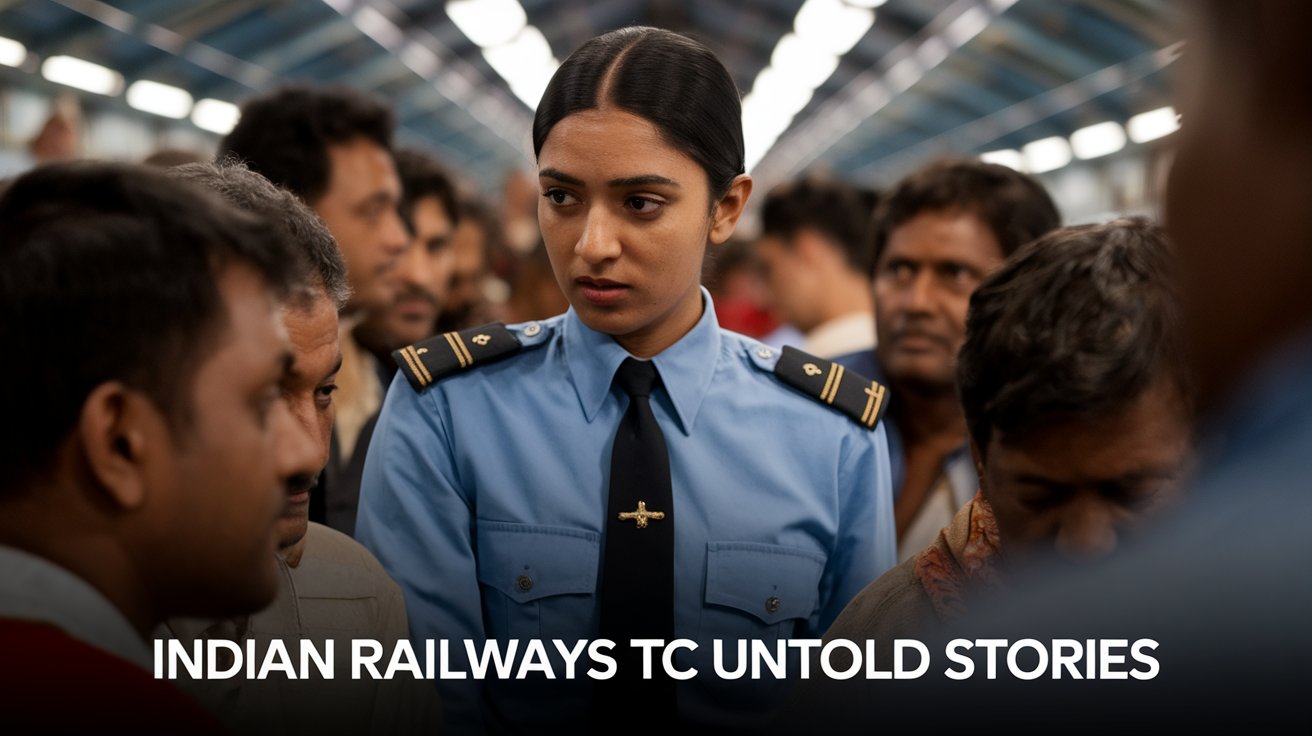In a country as vast and diverse as India, where millions travel by train every day, the role of the Ticket Collector (TC) in Indian Railways is not only crucial but also fascinating. While passengers often see TCs walking through train coaches or checking tickets on platforms, the life of a TC goes far beyond just punching tickets. It’s a job filled with responsibility, routine, interaction, and challenges.
This article takes you behind the scenes into the daily life, responsibilities, perks, and career path of a Ticket Collector in Indian Railways — a job that combines travel, people management, and public service.
Who Is a Ticket Collector (TC)?
A Ticket Collector is a railway employee responsible for verifying passenger tickets, collecting fines from ticketless travelers, and assisting passengers with travel-related issues. The post comes under the Non-Technical Popular Category (NTPC) and is highly popular among 12th-pass and graduate aspirants.
Video Credit: Daily Travel
Depending on their posting, TCs may work on-board trains (Travelling Ticket Examiner or TTE) or at platforms and stations (Station Ticket Collector).
Daily Life of a TC: What Happens in a Day
The daily routine of a TC varies based on their assignment:
1. Platform Duty (Station TC):
- Reporting before shift at the station
- Manning entrances/exits, checking tickets
- Handling queries about platform changes, train timings
- Coordinating with station staff for crowd control
- Filing reports about ticketless travelers or issues faced
2. On-Train Duty (TTE):
- Reporting 1-2 hours before train departure
- Collecting passenger charts and coach lists
- Boarding the train and taking position in assigned coaches
- Verifying reservations, adjusting vacant seats, and collecting fines
- Working long hours — often overnight on long-distance trains
The job is physically demanding and requires patience, especially while dealing with uncooperative passengers or managing huge crowds during festivals.
Responsibilities of a TC
- Checking Tickets: Ensure that all passengers have valid tickets or passes.
- Collecting Fines: Impose fines on ticketless or irregular travelers as per railway rules.
- Seat Allotments: Allot vacant or canceled seats to waitlisted passengers in order.
- Customer Service: Assist with queries related to seat location, timing, or train changes.
- Maintaining Records: Submit a daily report of ticket checks and fines collected.
- Ensuring Safety: Help manage overcrowding and report suspicious activity to RPF.
Skills Required to Be a Good TC
- Communication Skills: To deal effectively with passengers from all walks of life.
- Confidence and Authority: To manage situations where people may argue or refuse to pay fines.
- Patience and Discipline: Essential while working long hours and during peak travel seasons.
- Basic Computer Knowledge: To use hand-held devices or digital ticket checking systems.
Eligibility & Recruitment Process
To become a TC, you must apply through the Railway Recruitment Board (RRB) under the NTPC exams.
Eligibility Criteria:
- Minimum Education: 12th pass from a recognized board
- Age Limit: 18 to 30 years (relaxation for reserved categories)
- Nationality: Indian citizen
Selection Process:
- Computer-Based Test (CBT)
- Document Verification
- Medical Fitness Test
TCs are usually selected at the Group C level and trained for several weeks before joining.
Salary & Perks
Ticket Collectors earn a decent salary with additional perks and benefits:
- Basic Pay: ₹21,700 (as per 7th Pay Commission – Level 3)
- Gross Monthly Salary: ₹30,000–₹40,000 including allowances
- Allowances Include:
- Dearness Allowance (DA)
- House Rent Allowance (HRA)
- Night Duty Allowance (if working night shifts)
- Traveling Allowance (TA)
- Railway Duty Passes (free or discounted train travel for family)
Promotion & Career Growth
A TC can climb up the ranks through experience and departmental exams. The hierarchy is:
- Ticket Collector (TC)
- Senior Ticket Examiner (STE)
- Chief Ticket Inspector (CTI)
- Assistant Commercial Manager
- Divisional Commercial Manager
With dedication, a TC can reach gazetted officer levels over time.
Challenges Faced by a TC
- Dealing with Difficult Passengers: Not everyone cooperates easily, especially during penalty collection.
- Long Hours: Onboard TCs may work 10–12 hours, sometimes even overnight.
- Festive Rush: Managing heavy passenger loads during holidays requires calm and control.
- Weather Extremes: TCs posted at platforms must stand in heat, rain, or cold throughout their shift.
Despite these challenges, many TCs find their work rewarding due to the travel opportunities and the respect the uniform commands.
Why Consider a Career as a TC?
- Job Security: A permanent central government job with pension and retirement benefits.
- Growth Opportunities: Departmental promotions can lead to high administrative posts.
- Prestige & Uniform: TCs are respected figures in the public eye.
- Travel Perks: Work-based travel and free train passes allow you to explore the country.
Conclusion
The life of a Ticket Collector is more than just checking tickets. It’s a job that represents discipline, service, and responsibility in one of the largest railway networks in the world. For anyone looking to start a stable and respected career in government service, becoming a TC in Indian Railways is a rewarding path.
Whether you’re interested in travel, love interacting with people, or simply want a secure future, the TC job offers a unique combination of all these elements. Prepare well, apply through the RRB NTPC route, and you could soon be wearing the iconic black coat and badge — as a Ticket Collector in Indian Railways.
